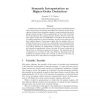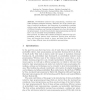283 search results - page 7 / 57 » Extracting Program Logics From Abstract Interpretations Defi... |
106
click to vote
ILP
2005
Springer
15 years 6 months ago
2005
Springer
In this paper, we focus on the problem of learning reactive skills for use by physical agents. We propose a new representation for such procedures, teleoreactive logic programs, al...
PRICAI
2000
Springer
15 years 4 months ago
2000
Springer
One of the main limitations when accessing the web is the lack of explicit structure, whose presence may help in understanding data semantics. Schema for web data can be constructe...
138
click to vote
EUSFLAT
2009
14 years 11 months ago
2009
Connectivity analysis methodology is suitable to find representative symptoms of a disease. This methodology describes connections between symptoms in particular way and then choos...
114
click to vote
JELIA
1990
Springer
15 years 5 months ago
1990
Springer
Traditional accounts of the semantic interpretation of quantified phrases and its interaction with reference and ellipsis have relied on formal manipulations of logical forms (qua...
126
click to vote
ALT
2004
Springer
15 years 10 months ago
2004
Springer
Probabilistic inductive logic programming, sometimes also called statistical relational learning, addresses one of the central questions of artificial intelligence: the integratio...


